Introduction
Are you looking for the best AI writing tools in 2025? You’re in the right place! AI writing software can help you write faster, better, and easier. These tools are like your personal assistant, helping with blogs, emails, stories, and more.
But with so many options, how do you choose the right one? Don’t worry. In this blog, we’ll compare the 11 best AI writing tools. We’ll look at their features, pros, cons, and prices. By the end, you’ll know which one is perfect for you.
1. Rytr
Rytr is one of the most budget-friendly and beginner-friendly AI writing tools. It’s ideal for anyone new to AI writing or on a tight budget. With Rytr, you can generate blog posts, product descriptions, email copy, and even creative writing pieces.

What makes Rytr stand out is its ability to support unlimited characters at an affordable rate. This is especially useful for freelancers or small businesses with a high volume of writing needs.
Features:
- AI-Powered Writing: Generates content in minutes by selecting your use case and tone.
- Plagiarism Checker: Ensures all content is unique and ready to publish.
- Writing Profiles: Showcase your content portfolio with a dedicated writer profile.
- Rich Text Editor: Edit, rephrase, and improve sentences easily.
Use Cases:
- Blog writing for small websites.
- Social media captions for startups.
- Ad copy for limited-budget campaigns.
Pros:
- Affordable plans starting at $9/month.
- Ideal for high-output writers needing cost-effective tools.
- Easy to use for beginners.
Cons:
- Advanced SEO metrics are not included.
- The interface is simple but could use more customization.
2. Jasper (Formerly Jarvis)
Jasper is a premium AI tool perfect for professional writers and businesses. It excels in creating both long-form and short-form content, such as blogs, product descriptions, and scripts. Jasper’s Boss Mode provides detailed content control, making it a favorite for those requiring in-depth output.

The integration with Surfer SEO makes it highly suitable for SEO-driven content strategies.
Features:
- 50+ Templates: Includes blog posts, ads, and video scripts.
- Boss Mode: Advanced settings for customized writing.
- SEO Integration: Syncs with Surfer SEO for optimized writing.
- Jasper Chat: An AI chatbot for real-time writing help.
Use Cases:
- Agencies producing SEO-optimized blogs.
- E-commerce stores creating product listings.
- Content teams collaborating on larger projects.
Pros:
- High-quality, human-like output.
- Great for teams with collaboration tools.
- Multilingual support for global businesses.
Cons:
- Pricey, starting at $49/month for basic plans.
- Learning curve for new users.
3. Quillbot
Quillbot specializes in improving text clarity and readability. It’s a go-to tool for students, content editors, and professionals who need quick paraphrasing or grammar fixes. The Summarizer feature is particularly handy for condensing long texts into key points.
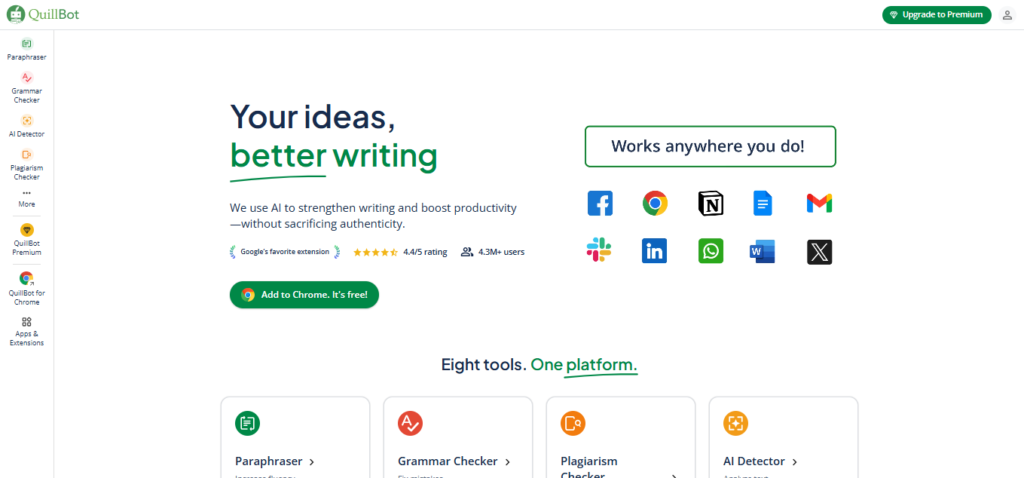
Features:
- Paraphrasing Modes: Adjusts fluency, tone, or creativity based on your needs.
- Grammar Checker: Detects and fixes errors instantly.
- Plagiarism Checker: Helps maintain originality in content.
- Chrome Extension: Write and edit directly in your browser.
Use Cases:
- Academic writing and editing.
- Rewriting website content for better clarity.
- Simplifying technical documents.
Pros:
- Free version with basic features.
- Easy-to-understand interface.
- Perfect for quick editing tasks.
Cons:
- Limited output in the free plan.
- Best suited for small-scale projects.
4. Frase
Frase is an all-in-one AI tool for content marketers. It goes beyond writing to include SEO insights, making it ideal for those looking to rank in search engines. Its real-time scoring system helps writers match their content to the best-ranking pages.
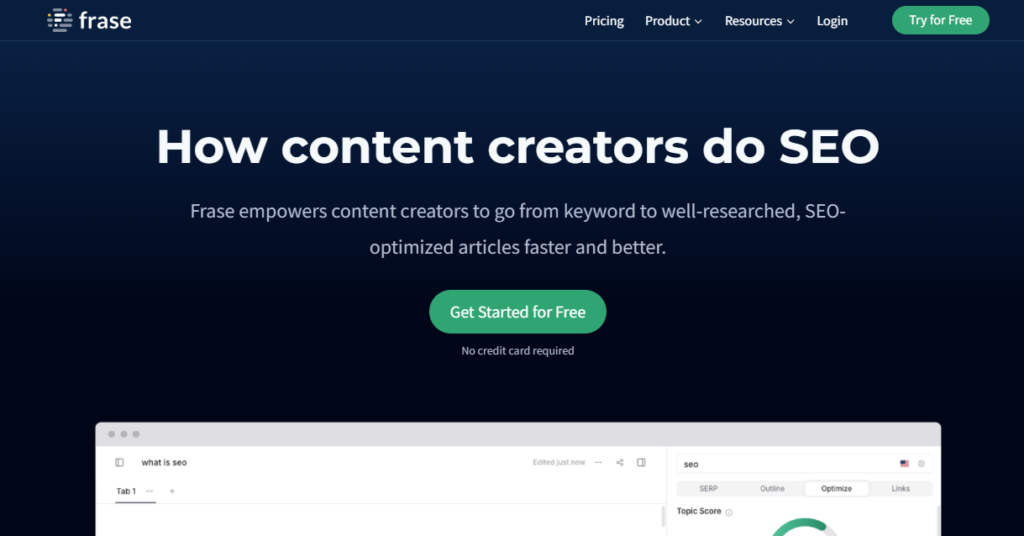
Features:
- SEO Content Briefs: Generate topic outlines with SERP analysis.
- Content Optimization: Real-time content scoring based on competitors.
- Custom AI Templates: Create templates for unique writing needs.
- Google Search Console Integration: Identify content gaps and opportunities.
Use Cases:
- Marketing agencies managing multiple clients.
- Blogs needing SEO-optimized content.
- Teams creating in-depth reports and analyses.
Pros:
- Comprehensive features for SEO and content marketing.
- Thriving community and customer support.
- Great for competitive content strategies.
Cons:
- Limited word count in lower-tier plans.
- Requires some learning for advanced features.
5. Copy.ai
Copy.ai focuses on helping businesses generate marketing content efficiently. Its simplicity makes it a favorite for small businesses and startups. Users can create email campaigns, ad copy, and even full blog posts with minimal effort.
Features:
- Content Templates: 90+ templates for specific needs.
- Quick Start Mode: Generate ideas and drafts fast.
- Editing Dashboard: Refine and polish content in real-time.
Use Cases:
- Social media managers posting daily updates.
- Small businesses creating product descriptions.
- Teams needing quick ad copy solutions.
Pros:
- High-quality output with a polished tone.
- Time-saving for marketing campaigns.
- Easy for non-writers to create engaging content.
Cons:
- Limited free plan (2,000 words/month).
- Slightly more expensive than alternatives, starting at $49/month.
6. Scalenut
Scalenut combines AI-powered writing with advanced SEO capabilities. Its Cruise Mode feature allows you to draft detailed articles in minutes, making it ideal for content creators with tight deadlines.
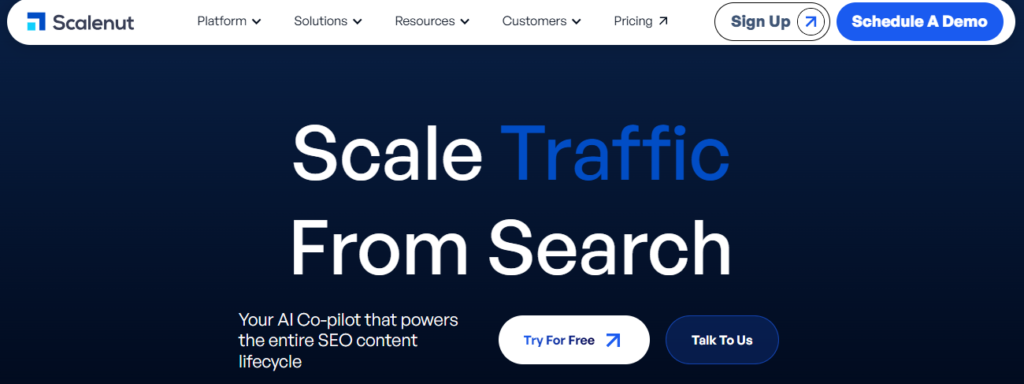
Features:
- Cruise Mode: Write long articles with minimal input.
- SEO Guidance: Provides NLP term suggestions for higher rankings.
- Content Scoring: Rates your draft’s readability and optimization.
Use Cases:
- Fast blog creation for niche sites.
- E-commerce content for product pages.
- Teams producing high-volume SEO articles.
Pros:
- Time-saving automation tools.
- Affordable for individuals and businesses.
- Real-time feedback on content quality.
Cons:
- Interface could use an upgrade.
- Limited customer support options.
7. Writesonic
Writesonic is a comprehensive AI writing tool with features for both text and image generation. Its Photosonic integration allows you to create visual content alongside written material, making it a great choice for content creators.
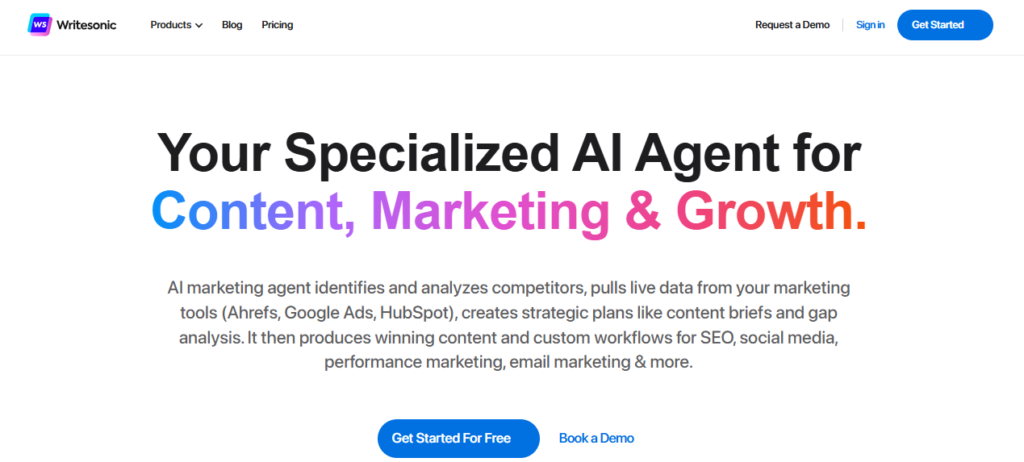
Features:
- AI Article Writer 4.0: Produces long-form content based on a brief.
- Photosonic: AI-generated images for visual storytelling.
- Sonic Editor: Advanced editor for paraphrasing, shortening, and expanding content.
Use Cases:
- Bloggers creating multimedia-rich posts.
- Social media content combining text and visuals.
- Agencies working on ad campaigns.
Pros:
- Flexible pricing with scalable plans.
- High-quality output for premium plans.
- Integration with SEO tools like Surfer.
Cons:
- Economy mode content is inconsistent.
- No native SEO features—requires integration.
8. Sudowrite
Sudowrite is a unique tool tailored for creative writers. It helps authors overcome writer’s block, generate story ideas, and refine their narratives. Its focus on fiction makes it stand out from other AI writing tools.
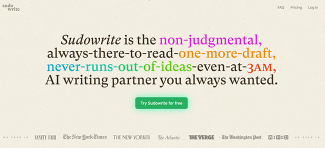
Features:
- First Draft Generator: Produces story outlines based on prompts.
- Rewrite Suggestions: Offers alternative wording for existing text.
- Description Enhancer: Adds sensory details to scenes.
Use Cases:
- Novelists drafting chapters.
- Screenwriters brainstorming ideas.
- Poets looking for creative inspiration.
Pros:
- Affordable, starting at $10/month.
- Perfect for storytelling and creative projects.
- User-friendly with an intuitive interface.
Cons:
- Not suitable for business or SEO content.
- Limited to creative writing workflows.
9. INK
INK is an AI-powered content assistant for marketers focused on SEO safety. Its Content Shield feature helps avoid penalties from search engines by rewriting AI-detected content.

Features:
- Content Shield: Ensures AI-written content passes Google’s spam filters.
- SEO Tools: Offers keyword research and optimization tips.
- Content Planner: Simplifies workflow management.
Use Cases:
- SEO-focused bloggers.
- Agencies producing content for competitive niches.
- E-commerce sites needing safe, optimized content.
Pros:
- Unique focus on SEO safety.
- Unlimited writing on all plans.
- Integrates with WordPress seamlessly.
Cons:
- High cost for entry-level plans.
- Limited keyword research credits.
10. WordHero
WordHero provides an impressive range of content options, making it ideal for diverse writing needs. Its Keyword Assistant tool ensures your text aligns with SEO goals, while its multi-language support makes it great for global businesses.
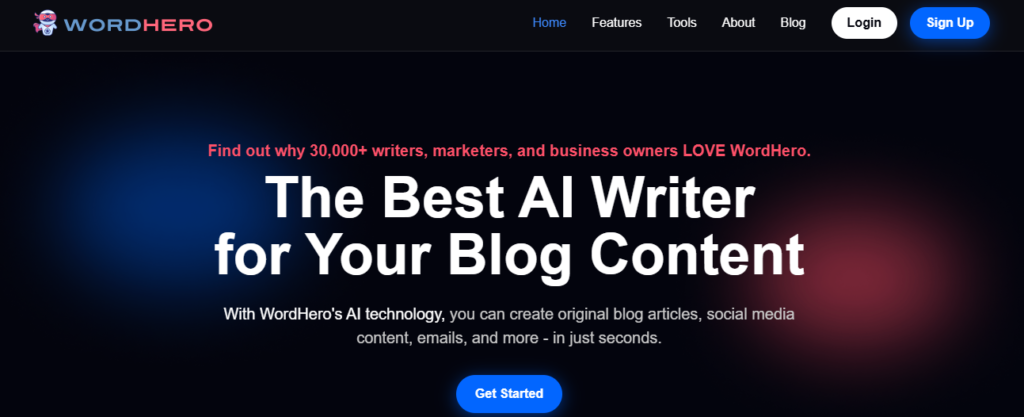
Features:
- 70+ Templates: Covers blogs, emails, and creative content.
- Keyword Assistant: Ensures keyword-rich content.
- One-Click Copying: Makes saving and sharing content easy.
Use Cases:
- Global businesses requiring multilingual content.
- Content creators working across various platforms.
- Freelancers needing an all-in-one tool.
Pros:
- Affordable unlimited plans.
- Wide variety of templates.
- Supports over 100 languages.
Cons:
- No free version.
- Advanced SEO features are basic.
11. Writecream
Writecream is a versatile tool with unique features for personalized outreach. It’s great for businesses that need tailored messages, like LinkedIn introductions or sales emails.

Features:
- Icebreaker Generator: Creates outreach messages for platforms like LinkedIn.
- SEO-Friendly Captions: Optimized for social media.
- ChatGenie: Offers advanced conversational AI support.
Use Cases:
- Professionals creating outreach campaigns.
- Content creators looking for AI-powered social media tools.
- Teams needing diverse writing options.
Pros:
- Free plan with generous limits (40,000 words/month).
- Suitable for marketing and outreach.
- Diverse toolset for content creation.
Cons:
- Not ideal for in-depth SEO tasks.
- Limited focus on long-form content.
Conclusion
AI writing tools in 2025 cater to a wide range of needs—from academic writing to SEO-rich blogs and creative storytelling. Each tool has unique features that make it suitable for different users. Whether you’re a marketer, freelancer, or author, there’s an AI tool for you.
FAQs
1. Can AI tools replace writers?
AI tools can assist writers but not replace them. Human creativity and critical thinking are still essential.
2. Which tool is best for SEO?
Frase and Jasper are excellent for SEO, offering integrations and optimization tools.
3. Are AI tools expensive?
Many tools have affordable plans, like Rytr and Quillbot. Premium tools like Jasper may cost more but provide advanced features.
4. Which tool is best for creative writing?
Sudowrite is the best for novelists, poets, and screenwriters.
5. Is AI-generated content safe for SEO?
Yes, tools like INK ensure SEO safety by avoiding Google’s spam filters.

I am a passionate digital marketer with a strong expertise in SEO and article writing. With years of experience in crafting compelling content and optimizing it for search engines, I help businesses enhance their online visibility and drive organic traffic. Whether it’s creating engaging blog posts or implementing effective SEO strategies, I am dedicated to delivering results that make an impact.
